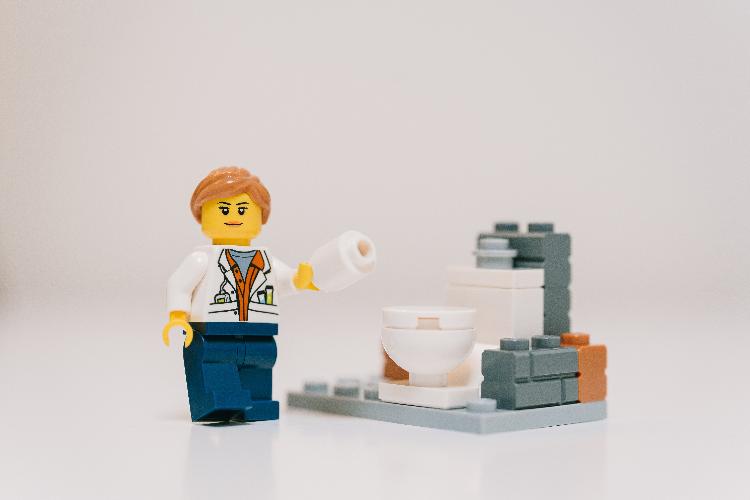Now, we have all heard the classic drink more water, eat more fibre and move more advice when it comes to constipation. Although this advice is absolutely correct and a good starting point for someone that doesn’t do much of the above, you will always have people who hit their fibre target (latest research suggests to aim for 30g/day), drink plenty of water (aiming for 2L per day) and do plenty of exercise yet still find themselves to be constipated. This article is to give some tip tips on more specific advice that can get those bowels working a bit better.
First thing to address: what actually is constipation? Constipation occurs commonly in the general population, impacting people across all age groups. Indicators of constipation include hard, dry stool (think pellets), difficulty in passing and often finding yourself straining and not having a bowel motion at least 3 times per week (it is not true that people need to open their bowels daily). Bloating and having a stomach ache can also be symptoms of constipation. A sudden change in bowel habit can indicate a sinister cause and so if this happens to you, please ensure you go and speak with your GP in the first instance.
Now that we all know what constipation actually is, let’s get to my top tips to help improve your constipation!
1) Kiwis
There is an enzyme present in kiwis called actinidine which has been shown to increase movement in the upper gastrointestinal tract. This can help relieve some symptoms of constipation such as improving how often you pass stool and reducing symptoms such as excess wind and bloating. Also, kiwi fibre absorbs triple its weight in water which leads to softer stool and larger stools, therefore, stimulating gut contraction and moving the stools along the bowel.
The research suggests that in order to have improvement, you should aim to eat 2 kiwi fruits daily, with improvements seen after 4 weeks.
2) Milled Linseed/ ground flaxseed
Research has shown that taking 2 tablespoons of these seeds over a 3 month period can improve how often you pass stool whilst also reducing abdominal pain and bloating. However, since the effects build up over time, it is important to take consistently over the recommended period in order to see any noticeable difference. These can be added to breakfast cereal/porridge etc, sprinkled over salad/yoghurt or added to smoothies! However, make sure you are drinking enough water as it can make you more constipated if you are not.
3) Psyllium Husk
Research has shown that 10g daily can help improve the frequency of bowels opening in addition to making it easier to pass stool. Again, this can be added to foods and drinks in the same way as linseeds. Also, in the same way as linseeds, you need to ensure that you are drinking enough water.
4) Prune juice
Prune juice contains many components that are believed to contribute to its laxative effects- namely magnesium, potassium and sorbitol. Sorbitol in particular acts as a laxative because when it is present in the large intestine, it causes water to be drawn to the gut as a response to its presence; this helps to loosen stool and promote movement within the bowel. However, since sorbitol is a sugar alcohol, it can cause bloating if too much is taken and so it is advised to start with ½ a glass and build up to 3 glasses per day. Some reports suggest that warming the prune juice helps it work even better.
5) Prunes
They work in the same way as prune juice but also contain insoluble fibre which is a type of fibre that acts as a brush to get things moving along the bowel. It is suggested to eat 6-10 prunes per day to have a noticeable effect.
6) Partially hydrolysed guar gum (PHGG)
This is a type of fibre which has some strong evidence behind it to support its use in helping with constipation. Research has shown that it can improve the time it takes for stools to pass along your bowel, improve the consistency of the stool so that it is less hard and can also stimulate the growth of ‘good’ gut bacteria.
7) Caffeine
This one may come as a surprise to many as it is more common for health professionals to advise on reducing excessive caffeine consumption as too much can cause dehydration, insomnia and irritability. However, for approximately 20 percent of people, a cup of coffee in the morning can stimulate the colon since caffeine acts as a central nervous system stimulant.
8) Magnesium citrate
Supplementation with magnesium citrate in the short-term if the above doesn’t work can stimulate bowel movement. This is because water is drawn into the gut due to the presence of the unabsorbed magnesium salts.
Research suggests that you should supplement with 400mg for 3-6 weeks.
9) Listen to your body!
This may sound like an obvious one but many people do not go to the loo when they have the urge to open their bowels but instead hold it in. This may be secondary to a number of reasons such as not feeling comfortable passing stool in the workplace, being in an area with dirty toilets etc. However, it is important to be aware that the longer the stool is held in, the more water is reabsorbed from the stool in the colon and so this increases the likelihood of the stool becoming drier and more difficult to pass.
10) Last but not least, be aware of your toilet positioning! This can significantly help improve straining and can help you empty your bowels more completely. The recommended position is one whereby your knees are higher than your hips- kind of like a squatting position. You can use a step-stool to put your feet on whilst using the toilet to help raise those knees above the hips or you can purchase a ‘squatty potty’ which is similar to a step stool.
And there you have, my top ten tips. If you decide to trial any of the above, I would advise that you trial one at a time to see what best works for you and not overwhelm your gut. Happy pooping!

